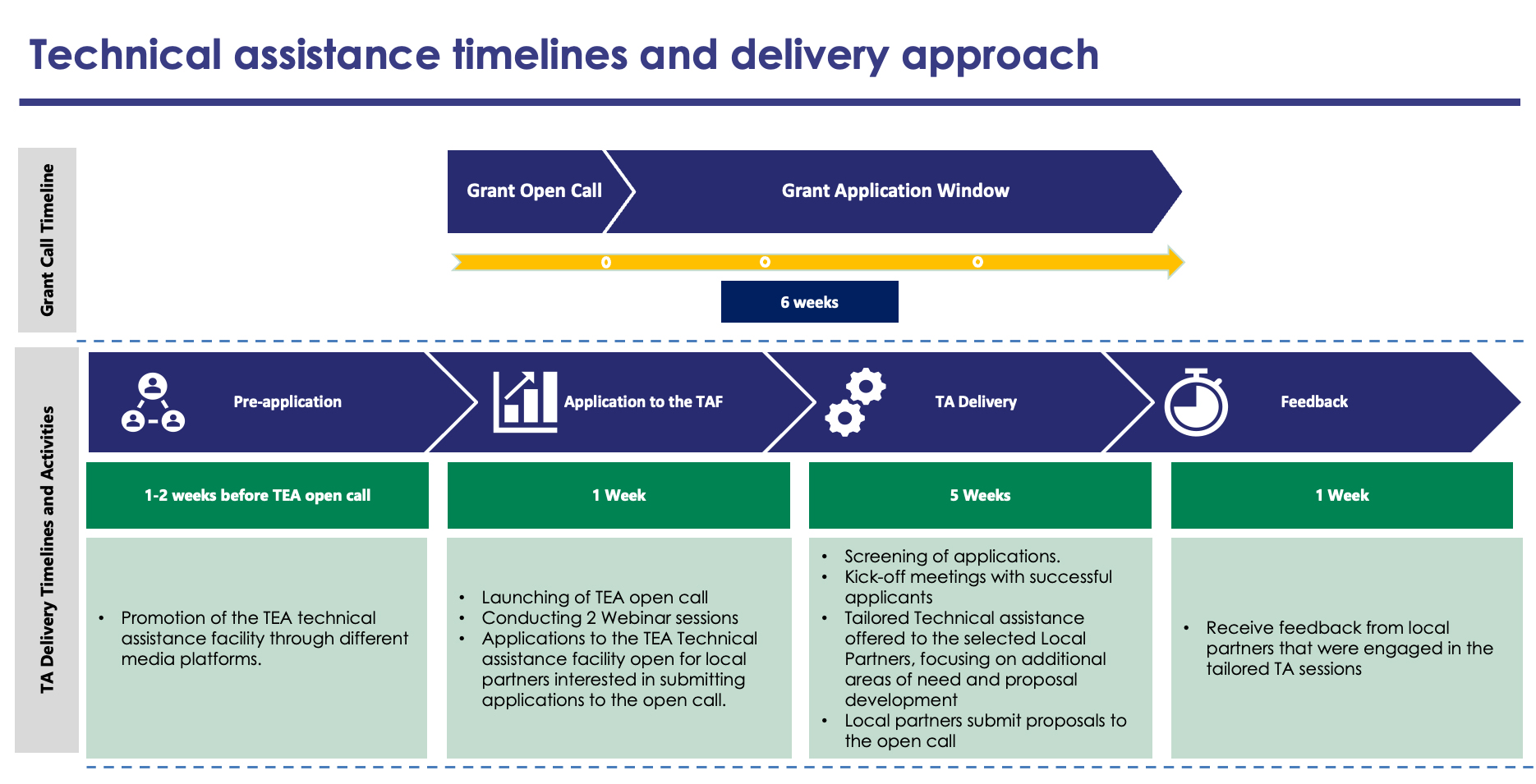Local partners have a unique ability to bring a first-hand understanding of their market needs and context, to support tangible and lasting progress towards SDG7. As part of the Transforming Energy Access (TEA) platform’s Local Partnership Inclusion activity, TEA has launched a Technical Assistance (TA) Facility, to maximise the potential of local partners to successfully access grant funding, unlocking opportunities to drive impact in the markets they know best.
Innovators and enterprises in the clean energy sector are fundamental to efforts to realise SDG7 and improve access to affordable, reliable, sustainable energy. Among the key barriers faced in getting innovative solutions from concept stage to commercialisation, difficulty accessing finance can hinder progress. Grant funding has an important role to play in bridging this finance gap – to provide a springboard for enterprises to derisk new innovations, develop business models, and demonstrate their potential to secure further funding.
To secure grant financing, applications typically enter a rigorous and highly competitive selection process. Applications are assessed on the articulation of their vision, projected impact on target region, and ability to outline the long-term viability of their business model. For many locally-led organisations, who may not have the same levels of experience and technical skill in developing competitive proposals, it can prove to be a barrier to access available funding.
To overcome this, the TA Facility will take a tailored approach to supporting local partners to understand key requirements in the grant application process and develop their grant writing skillset, to help improve their chances of success.
The TA Facility will be delivered by EED Advisory, a multidisciplinary Pan-African consulting firm offering technical, analytical and advisory services in energy, water and climate change.
What is covered
There is no one size fits all model. The TA Facility is both comprehensive and bespoke to the needs of applicants, to provide support in areas that offer most value to them. Topics will include:
- Understanding and navigating common challenges in grant applications.
- Budgeting techniques.
- Developing key performance indicators (KPIs).
- How grant applications are evaluated and differentiators of success.
- Reporting requirements and compliance measures.
- Internal human resource allocation strategies.
- The role of networking in successful grant funding.
- How to measure and evaluate the impact of funding.
- Integrating social and sustainability considerations.
- Risk mitigation strategies.
Alongside developing a rounded skillset to target future funding opportunities, the TA Facility will also seek to support local partners applying for current grant funding opportunities across the TEA platform partners.

Eligibility criteria
The criteria have been designed to broadly consider the following:
- Local partner criteria which comprise three categories of which applicants must meet two of the following:
- Operational location (Geographic): the organisation/business is based in any of the target regions/ countries.
- Founding/ownership: Organisation/business ownership structure is in line with meeting the stipulated majority (over 51%) ownership/founding by citizen/ diaspora citizen/ refugee, migrant or forced displaced person/indigenous people/communities in the target regions/countries.
- Networks and support: Organisation/business that is a network or organisation which provides support to autonomous national/regional network/organisations; supports and delivers to indigenous peoples/communities; supports and delivers to refugees, migrants and forced displaced persons.
- Registration criteria: organisations/businesses that have been in existence for over 2 years.
- Legal status criteria: organisations/business that have formal legal status.
The above 3 criteria are mandatory, and lack of compliance and fulfilment instantly disqualifies an organisation from proceeding with filling in the application form.
TEA’s definition of local partners:
- Organisations, businesses, entities, enterprises, academic institutions, and entrepreneurs that are fully based in sub-Saharan Africa South/Southeast Asia, and the Pacific Island Countries (which only operate in these regions/countries).
- Organisations, businesses, entities, and enterprises that are majority (over 51%) ‘owned’/founded by citizens, diaspora, indigenous people, or refugees, migrants or forcibly displaced people, of the target regions.
- Autonomous national/regional networks/organisations/associations/academic institutions operating in the target region. This can include autonomous organisations that are part of an international organisational, enterprise, network or institutional framework.
How to apply for the technical assistance
There are no opportunities currently open for applications at this time. To be alerted to the opening of the next application window, and to be kept informed of future opportunities, we recommend registering your interest using the form below.
*Please note that registering your interest does not constitute an application for support. Registering your interest will ensure you are notified by email when applications open, you must then follow the required steps to submit an application.
For any questions or enquiries about the TEA technical assistance facility, contact: tealocalpartnerships@eedadvisory.com
TA Facility Webinars
As part of the TEATechnical Assistance Facility support, two webinars delivered by EED advisory offer foundational knowledge on the grant application process for local partners.
Watch the webinar recordings below:
Webinar 1: Developing compelling proposals for grant funding: Insights and advice from the Transforming Energy Access Technical Assistance Facility -webinar series (Part 1 of 2)
Hear insights from Dr. Benjamin Robbinson, an expert on action and policy-based projects across the humanitarian and wider international development energy – on effective and responsive grant proposal writing.
Webinar 2: Navigating the grant application process: Insights and advice from the Transforming Energy Access Technical Assistance Facility – webinar series (Part 2 of 2)
Hear guidance from Dr. Tedd Moya, Director at EED Advisory and an accomplished legal and policy expert specialising in international energy law, climate finance, and energy transitions – on the strategies that local partners can adopt during the grant application process.